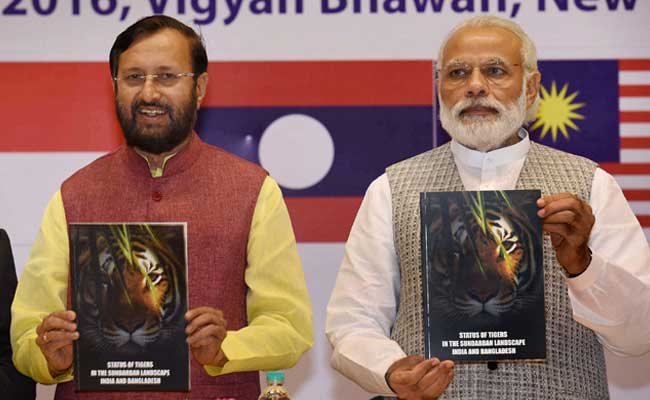
PM Modi at Asia Ministerial Conference on Tiger Conservation said forests are inseparable from wild animals and both are mutually complementary.
Quick Take
Summary is AI generated, newsroom reviewed.
Global tiger population rises for the first time in 100 years
Conservation of tiger or nature not a drag on development, says PM Modi
PM was speaking at inaugural session of conference on tiger conservation
Noting that conservation of tiger or nature is "not a drag" on development, the Prime Minister insisted that both can happen in a mutually and complementary manner and emphasised on the need to reorient the strategy.
PM Modi said forests are inseparable from wild animals and both are mutually complementary.
"Destruction of one leads to destruction of the other. This is an important cause of climate change which is now affecting us adversely in many ways. This is a global phenomenon which all of us are grappling with," he said.

PM Modi was speaking at the inaugural session of the three-day 3rd Asia Ministerial Conference on Tiger Conservation where tiger range countries will discuss key issues including anti-poaching strategies.
Noting that tiger habitats have reduced drastically across tiger range countries, the Prime Minister said the situation has been aggravated by the ongoing trafficking in body parts and derivatives of this magnificient animal.
"A major threat to the tiger is the demand for its body parts. The forest and its wild denizens are an open treasury which cannot be locked up. It is painful to learn about trafficking of body parts of tigers and other big cats. We need to collaborate at the highest levels of governments to address the serious issues, he said.
"In India too we have been facing the challenge of poaching. The positive side for us in India is that the majority of people respect trees, animals, forest rivers. They consider earth as mother and the universe as one family," PM Modi added.
The Prime Minister said there is a need to define conservation as a means to achieve development rather than considering it to be "anti-growth".
"We can achieve a framework to foster proactive engagement of industry for conservation. The natural capital denoting the stock of natural system should be treated at par with capital goods. Our economy needs to be viewed as a subset of a larger economy of natural resources and ecosystem services which sustain us," he said.
More than 700 tiger experts, scientists, managers, donors and other stakeholders are gathering to discuss issues related to tiger conservation.
Track Latest News Live on NDTV.com and get news updates from India and around the world

